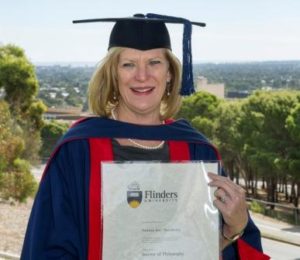 Any PhD has aspects of a marathon, but for Trish Thornberry (pictured) the process of completing her thesis was more in the nature of a steeplechase, with plenty of falls along the way.
Any PhD has aspects of a marathon, but for Trish Thornberry (pictured) the process of completing her thesis was more in the nature of a steeplechase, with plenty of falls along the way.
Dr Thornberry’s PhD was conferred at Flinders University’s April graduation ceremonies.
The former nurse began her doctorate while employed as a lecturer at the University of New England (UNE) in Armidale. Her role at UNE included co-ordinating nursing internships in country NSW, which entailed numerous two-day, 1200 km trips.
Her familiarity with the rural health system, which included a role on a regional health board, led her to embark on a thesis that examined the effects of major structural change for staff in the NSW rural health system.
The reorganisation of health services in NSW from 2002 to 2005 saw a network of 17 area health services merged into four metropolitan and four rural Area Health Services. This led to a significant part of the workforce being reassigned, transferred or made redundant.
Many workers, subjected to ongoing uncertainty, became disgruntled; some resigned in response. Those who were remained in the system, Dr Thornberry said, were often too afraid to give voice to their feelings.
In addition to caring for her four daughters, Dr Thornberry had to contend with changes of employment and supervising institution, as well as recovery and rehabilitation after two accidents, one of which resulted in the amputation of half her left foot.
Dr Thornberry was six months into her thesis when injuries from an accident with a ride-on mower and the resulting amputation saw her undergo lengthy rehabilitation. A second accident that broke her wrist produced painful complications, causing another long delay.
After two years of research, a chance meeting at a conference with Professor Jennene Greenhill, now Director of the Flinders University Rural Clinical School, eventually led Ms Thornberry to transfer the supervision of her PhD to Professor Greenhill and School of Medicine academics Professor Eileen Willis and Dr Linda Sweet.
Not long after transferring to Flinders, Dr Thornberry left her job at UNE to become a clinical educator with private provider Ramsay Health Care, based in Tamworth. She now manages the newly opened rehabilitation unit at the hospital.
“It was a very interesting journey – personally, professionally and academically – as I was doing my thesis,” she said.
To provide data for her research, Dr Thornberry interviewed 21 rural health workers and surveyed a further 65 by online questionnaire.
Many of the responses were “emotionally laden”, which led to an unusual aspect of Dr Thornberry’s thesis: the inclusion of poems based around key words drawn from transcripts.
Although unorthodox, the approach impressed her supervisors and examiners.
The thesis concluded that much of the distress experienced by the health workforce was due to poor consultation processes, a lack of transparency and inadequate communication on the part of the administration.
“It’s not rocket science, but people keep on getting it wrong,” Dr Thornberry said.


Prof Eileen Willis and Dr Linda Sweet are both from School of Medicine not Nursing and Midwifery.
Wonderful…truly inspiring!
I like the idea of the poetry. It suggests a strong connection with the transcripts and a commitment to share personal narratives in a ‘safe’ way. As Abraham says, a truly inspiring journey!